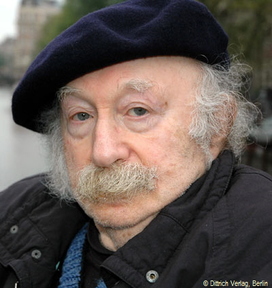Edgar Hilsenrath's death has received meager attention, compared with the demise of Amos Oz for example.
I haven't read all of Hilsenrath's books, but to me he was one of the most important postwar German authors. "Night" (Nacht) made even a bigger impression on me than his famous"“The Nazi and the Barber” (Der Nazi & der Friseur).
Harrison Smith writes in The Washington Post:
'Mr. Hilsenrath’s novel also featured Jewish characters who rape and brutalize women in the ghetto — a dark shading that generated controversy in West Germany, where, Mr. Hilsenrath noted, most contemporary novels about the Holocaust idealized its Jewish victims. “The Jews in the ghetto,” he told Der Spiegel, “were every bit as imperfect as human beings anywhere else.”
“Hilsenrath’s priority is the plight of the oppressed,” German scholar Dagmar C.G. Lorenz wrote in “The Routledge Encyclopedia of Jewish Writers of the 20th Century.” “Disregarding official versions of history he explores aspects of domination: lust, sexual gratification and greed, all merging into the ecstasy of power. Few other writers have so candidly exposed the ties between sadism, politics, war and genocide.”'
Read the obituary here.
One reason why Mr. Hilsenrath's fame and literary standing has been diminished is that we don't have the feeling anymore that the catastrophe is behind us, many of us believe that the catastrophe is ahead of us, in other words, we have moved from a postwar era to a prewar era. In such an era the laughter that Hilsenrath provokes might be too dark.
If your priority is the plight of the oppressed, often you have to disregard official versions of history, in these days, where it's victims versus oppressors, we have little appetite for the grey zone, even though this is the zone where most of us operate in.
It would be interesting to compare "Night" with Borowski's stories. Anyhow, it's a good time to read Hilsenrath.
